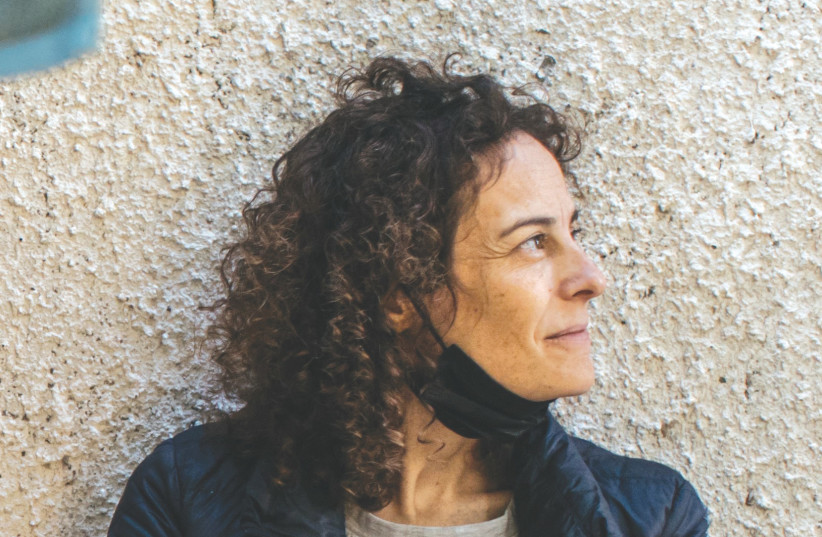“I wanted to tell this story with compassion, not just realism,” said Michal Vinik, the director of Valeria is Getting Married, which opened throughout Israel on March 23.
The movie tells the story of Christina (Lena Fraifeld), a Ukrainian woman who is married to an Israeli man, in an arranged marriage, and whose sister, Valeria (Dasha Tvoronovich) is arriving from abroad to enter into a similar arrangement.
Vinik – who made the movie Blush, in 2015 and who wrote the screenplay for Michal Aviad’s Working Woman, Israel’s first MeToo movie – won the 2022 Ophir Best Screenplay Award for Valeria. The movie also won the Israeli Feature Film competition at the Haifa International Film Festival. She is interested in issues that have to do with gender and power, and she got the idea for the script for Valeria after she got to know a cleaner in Israel who was not Jewish and was in the country illegally.
“I thought about the idea of someone working in a country with no citizenship, knowing few people here, knowing they can be sent home at any time.”
Michal Vinik
The inspiration for the movie and the challenges of filming
“I thought about the idea of someone working in a country with no citizenship, knowing few people here, knowing they can be sent home at any time,” she said.
This led her to think more deeply about arranged marriages between women from Eastern Europe, desperate to escape their bleak economic circumstances, and Israeli men who find them attractive and are comfortable being in a relationship where, essentially, they can send their wives home whenever they feel like it. She also considered more general issues about power imbalances between the genders, especially in marriage.

“The idea that women can be equal financially to their husbands is relatively new,” she acknowledged. “For so many years, women often couldn’t, and sometimes still can’t get divorced because of the economic inequality.”
She began to look at online sites for men looking for brides from Eastern Europe and other parts of the world. The dramas she discovered unfolding there were fascinating to her. She found herself sympathizing with the women, but also got interested in what the men had to say. Her perception was that the men “feel humiliated. Everyone in the world has a way to justify their positions, no one thinks he is a bad guy. It’s more complicated.”
The plot began to take shape in her mind. The film, which runs just 76 minutes, tells a complex story. During this day, Christina prepares excitedly for the arrival of her sister, Valeria. Christina has been living in Israel for more than a year with her husband, Michael (Yaakov Zada-Daniel), and has learned Hebrew and works in a nail salon.
She is converting to Judaism and will become a citizen in another year. Michael makes a living by brokering deals between Israeli men and women from abroad, and has arranged for Valeria to marry Eitan (Avraham Shalom Levi).
Valeria arrives and Christina is ecstatic at having her sister with her. But when Eitan shows up and awkwardly tries to woo Valeria, things don’t go so smoothly. From his point of view, he is doing everything right. He sent flowers, bought her a top-of-the-line smartphone and learned Russian phrases (the sisters are from a Russian-speaking region of Ukraine). But she has a negative reaction and doesn’t have the grace to conceal it.
“Valeria is a woman who can’t give up on her romantic dream,” Vinik said. “I really came to love these characters. I tried to put myself in their shoes.”
FINDING THE right actors was key to the story. Lena Fraifeld had been living in Israel for years, but for Valeria, they knew they needed an actress “who wouldn’t have Israeli body language. We went to Kyiv and found Dasha, who speaks English and Russian. She and Lena would speak Russian to each other, a language the crew didn’t know.”
Once she had the script and the actors, it was time to start shooting, but the coronavirus pandemic got in the way. Vinik was able to get permission to shoot the movie – filmmakers were allowed to continue working if they complied with certain conditions – but getting permission for her lead actress to enter Israel was difficult.
The Culture Ministry allowed her to come to Israel, provided she was quarantined first, and they rehearsed on Zoom. “But Dasha didn’t understand the concept of quarantine. They didn’t have it in Ukraine. We called her to see how she was doing at the hotel, and she was in the Carmel market.”
Eventually, they managed to film the movie. They were doing post-production work on the soundtrack when Russia invaded Ukraine and the war began. Tvoronovich was in Poland when the war broke out, but returned to the western part of Ukraine, which was relatively safe at the time. Vinik still keeps in touch with her.
Vinik is currently working on a television adaptation of a Dror Mishani novel, The Man Who Wanted to Know Everything, about violence against women, as well as a feature film about a woman whose son wants to go into a combat unit in the IDF in spite of his mother’s opposition.
Valeria is Getting Married will be playing at film festivals around the US and the world, next at the Wisconsin Film Festival in April.
The film had its world premiere at the Venice International Film Festival, where it was received enthusiastically. “I’m very cynical and even I got emotional at the Venice screening,” she said.
She has been to many screenings around the world and has seen many people, especially women, react similarly. “Older women get mad at Valeria, saying she knew what she was getting into,” she said. “And lots of women get mad at the men, saying, ‘How can they buy brides?’”
